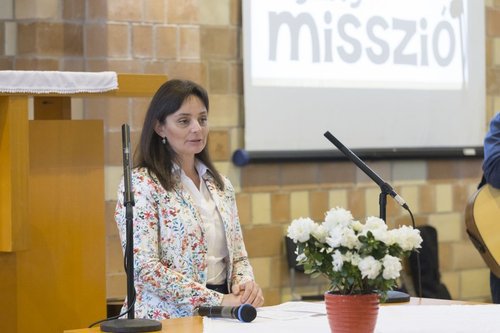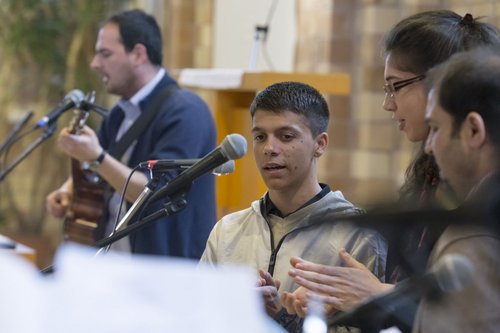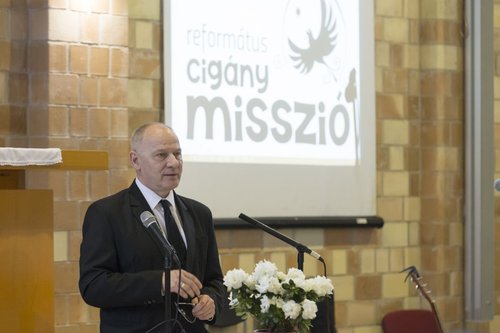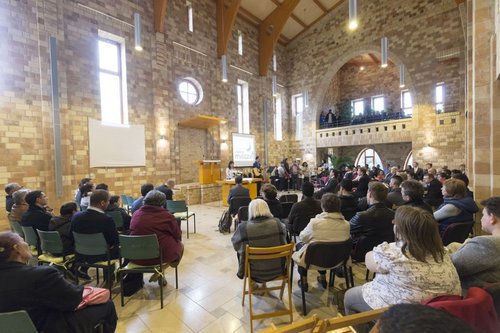More than three hundred people gathered in the reformed church of Káposztásmegyer for the Hungarian Roma Mission’s Annual Prayer Meeting on the 9th of April. A sermon was given by István Szabó, Presiding Bishop of the RCH. Those who gathered prayed together in small groups for the Roma people, the Church, and asked for the Lord’s help for their ongoing problems. The worship was led by the members of Budapest’s and the Zemplén region’s various congregations.
“The righteous person may have many troubles, but the Lord delivers him from them all,” Mrs. Langerné Victor Katalin, Deputy State Secretary for Social Inclusion at the Ministry of Human Resources, said as he greeted those who were gathered. The members of the Roma Mission are all connected not just by common hardships, but by the common experience of the deliverance and the joy of liberation.

Zoltán Balog, Minister of Human Capacities, couldn’t be there in person, but sent his greetings, which were read by Kálmán Káli-Horváth, an artist, poet, and director of the Reformed Roma College of Budapest. The minister emphasized the role of the Roma Mission in the life of the whole country, because the state’s efforts to help the disadvantaged can bear fruit only if the souls are prepared. The responsibility is mutual: the case of the Roma cannot be settled without the support of mainstream society, just like the betterment of Hungary is impossible without the active cooperation of Roma society. The minister’s letter remarked on the value of the Roma’s musically rich religious life. Their worship music is accompanied by guitars, drums, and synthesizers, bringing a more relaxed atmosphere to what is, at times, perhaps a little too serious of a traditional reformed church setting.
We were able to experience that when the worship band – made up of Roma congregation members from Zemplén and Budapest – struck up their unique songs that were based on their own folk traditions but rewritten with deeply personal and devoted Christian lyrics. “Now I’m living my most beautiful years / as I wait for the Lord Jesus, the return of my fiancé,” sang Julianna Gombos form Olaszliszka, who snuck some lively gypsy beats even into old traditionally hymns like “God is here among us.”

“It has the fire inside,” she says when summarizing the essence of Roma worship. “There is a melody we like, and the new lyrics are inspired by the Holy Spirit of God.” She initiates us into the secrets of their songwriting know-how. Since 2011 she has been a member of a local missionary church made up of fifty to sixty people, planted by the legendary church planters “Uncle” Dániel Szabó and the Korean missionary, Choi, who started several Roma missionary congregations in northeastern Hungary. “For about a month I just listened to the services, but then I wanted to participate, so I told pastor Choi that I have guitar skills. He replied in his typical broken Hungarian, saying, ‘One guitarist is good, but two guitarists are better.’ Since that moment, I’ve been a member of the worship team.”
After the worship block came the sermon by the Danubian Diocese’s Bishop, István Szabó. His teaching was based on Acts, chapter 10 and was titled, “Now we are all here in the presence of God.”

To make the meeting of Peter and Cornelius happen, they both needed to trust God. A Roman soldier and a religious Jew normally didn’t even talk to each other, but God spoke to both of them, and the final result was Peter preaching the Gospel to the Roman soldier and his companions, and they were born again. This story leads us to stand into the presence of God together too, because there is no “solo Christianity.” God calls us into community and communion. If we do not love the Lord, it’s impossible to love each other, but if we love Him, He will make us able to love each other.
“In our story, who is Peter and who is Cornelius? I mean, who has something to say to the other?” Matthias Herren, leader of the HEKS Swiss Protestant Charity Aid’s Hungarian chief asked the group, based on the sermon. The role is mutual, the mission is not one-sided. The Church is enriched by the Roma people, just like they are by the Church. Goth calls both to each other, he concluded.
The Protestant unity was represented by Lutheran Pastor Péter Bakay, who drew attention to those who were not at the meeting – those who were literally not in attendance and also those who, metaphorically, do not know the grace of God.
“All this is for your benefit, so that the grace that is reaching more and more people may cause thanksgiving to overflow to the glory of God,” said Szabina Sztojka, a theology student and part-time Roma Mission colleague, quoting Second Corinthians 4:15. Church leaders form all across Hungary and the neighboring countries said prayers for the Roma community, the Church, those who are illiterate, the unemployed, those who suffer due to unsavory loan schemes, and those forced into child prostitution.

After the main prayers, people were divided into small prayer groups to share personal prayer requests with each other. Finally, Ágnes Nyeső, National Roma Mission Coordinator of RCH, kept her commissioning sermon, praying to the Lord, “to send workers to the harvest,” because there are many growing churches living without a pastor.
For the final part of the meeting, some of the sixteen participating churches introduced themselves in a small musical ministry. Here we could observe how different these communities are: one sang a hymn with a fifty-person choir and another performed a popular contemporary worship song in the Lovari language. In this diversity, one thing is common: they all work day by day with the power of the Gospel among them, tearing down the walls between Roma and non-Roma.
“I’ve always believed in God, but now I know Him.”
The free time after lunch that people spent together just chatting and getting to know each other may have been even more meaningful than the organized programs at the meeting. The members of the sixteen churches from all over Hungary and the diaspora, from across the borders, began to talk and play music spontaneously.
This was the time we met Aladár and his son. They are from Becsked, in northeastern Hungary, by the Bodrog River. Their congregation is made up of fifty people and is about two years old. It was, as with many other Roma churches nearby, planted by pastor Choi and “Uncle” Dániel Szabó. Aladár was invited to attend by his youngest son, who born again at the age of fifteen. Later, Aladár’s other son and his girlfriend joined, too. “I have always believed in God, but not like I do now. Now I know Him, who showed me signs and helped me through troubles. I have deep-artillery thrombosis. That kills most people who have it, but I survived. I was praying for nine days non-stop, and God healed me. Since then, I take just one pill, a blood thinner, but nothing else – I need no painkiller or any other medicine. It’s a real miracle.” Aladár proudly calls to his son, Árpád, “Come, tell us about your plans!” We get to know that the young Árpád, now a locksmith student, plans to apply to the College of Reformed Theology in the nearby town, Sárospatak, after his exams.
Illés Molnár
ciganymisszio.reformatus.hu